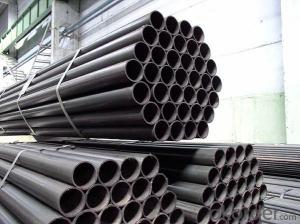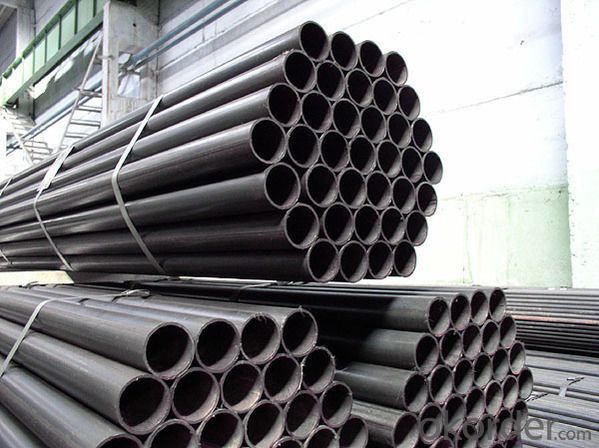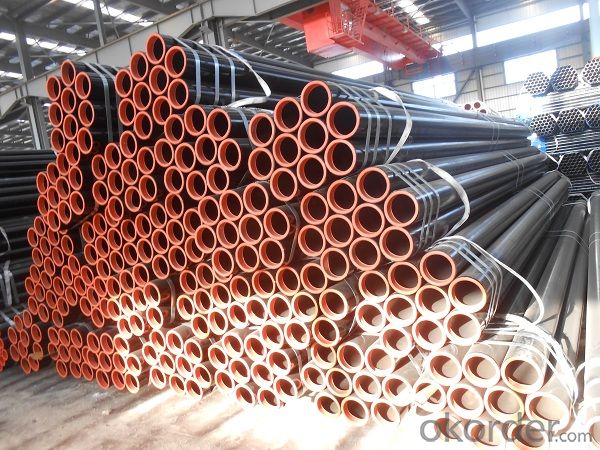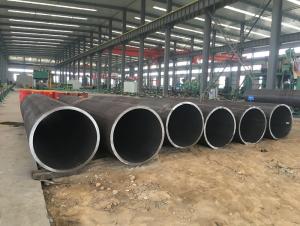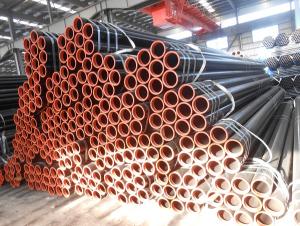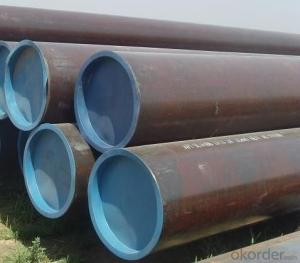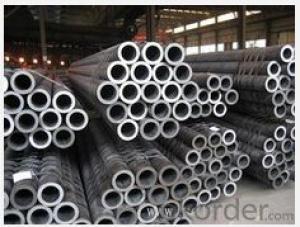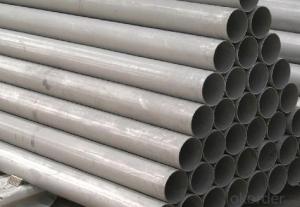Seamless steel pipe for natural gas pipeline
- Loading Port:
- Tianjin
- Payment Terms:
- TT or LC
- Min Order Qty:
- 20 m.t.
- Supply Capability:
- 13000 m.t./month
OKorder Service Pledge
OKorder Financial Service
You Might Also Like
1、Structure of Seamless steel pipe for natural gas pipeline:
Square tube, square tube is a kind of call and rectangular tube, is equal and not equal to the length of steel pipe. Is the strip through the process of processing roll system. In general is the strip through the demolition of the package, flat, curly, welded to form a circular tube, and then rolled into a square tube and then cut into a square tube and then cut into the required length.
2、Main Features of Seamless steel pipe for natural gas pipeline:
• High manufacturing accuracy
• High strength
• Small inertia resistance
• Strong heat dissipation ability
• Good visual effect
• Reasonable price
3、 Seamless steel pipe for natural gas pipeline Specification:
Standard | GB, DIN, ASTM |
Grade | 10#-45#, 16Mn 10#, 20#, 45#, 16Mn |
Thickness | 1.5 - 25 mm |
Section Shape | Square and rectangular |
Outer Diameter | 20*20 mm-------400*400mm 20*30mm*300*500mm |
Place of Origin | Tianjin, China (Mainland) |
Length | 3-12M |
Outer Diameter | 20*20 mm-------400*400mm 20*30mm*300*500mm |
Grade | 235B 345B |
Standard | ASME, ASTM |
1) Material:(ASTM A 106/A53 GRB.API5LGRB,GB,235B,345B
2) Specification range:OD: 20*30mm----300*500mm 20*20 mm---400*400mm ,WT: 1.5 - 25 mm ,length:3-12m or according to the requirement of clients.
3) Excutive standards:GB,ASME API5L.ASTM A 106/A53,Despite of the above
4) Surface:black lacquered,varnish coating or galvanized.
5) Ends:Beveled or square cut ,painted.
6) Packing:bundles wrapped with strong steel strip,seaworthy packing.
4、Packaging & Delivery
Packaging Details: | seaworthy package,bundles wrapped with strong steel strip |
Delivery Detail: | 15-30days after received 30%TT |
5、FAQ of Seamless steel pipe for natural gas pipeline:
①How is the quality of your products?
Our products are manufactured strictly according to national and internaional standard, and we take a test
on every pipe before delivered out. If you want see our quality certifications and all kinds of testing report, please just ask us for it.
Guaranteed: If products’ quality don’t accord to discription as we give or the promise before you place order, we promise 100% refund.
②How about price?
Yes, we are factory and be able to give you lowest price below market one, and we have a policy that “ for saving time and absolutely honest business attitude, we quote as lowest as possible for any customer, and discount can be given according to quantity”,if you like bargain and factory price is not low enough as you think, just don’t waste your time.Please trust the quotation we would give you, it is professional one.
③Why should you chose us?
Chose happens because of quality, then price, We can give you both.Additionally, we can also offer professional products inquiry, products knowledge train(for agents), smooth goods delivery, exellent customer solution proposals.Our service formula: good quality+good price+good service=customer’s trust
SGS test is available, customer inspection before shipping is welcome, third party inspection is no problem.
6、 Seamless steel pipe for natural gas pipeline Images:
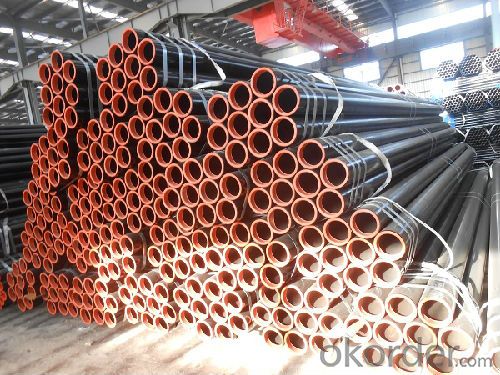
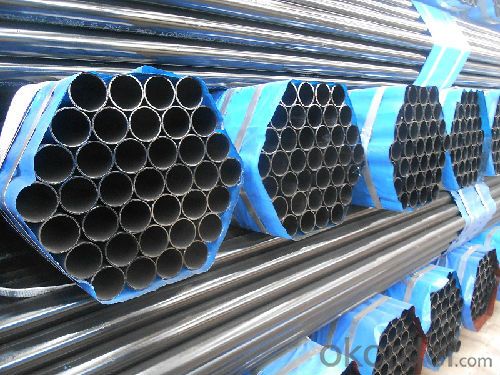
- Q: How do you calculate the pipe volume for steel pipes?
- To calculate the pipe volume for steel pipes, you can use the formula V = πr^2h, where V represents volume, π is a mathematical constant (approximately 3.14159), r is the radius of the pipe, and h is the height or length of the pipe.
- Q: What are the advantages of using steel pipes in irrigation systems?
- There are several advantages of using steel pipes in irrigation systems. Firstly, steel pipes are highly durable and can withstand harsh weather conditions and heavy loads, ensuring a long lifespan. Secondly, they have a high tensile strength, which means they can handle high pressure and water flow rates without the risk of bursting or leaking. Additionally, steel pipes are resistant to corrosion, which is crucial for maintaining water quality and preventing contamination. Lastly, steel pipes are easy to install and maintain, making them cost-effective in the long run.
- Q: How are steel pipes used in the construction of gas distribution networks?
- Steel pipes are commonly used in the construction of gas distribution networks due to their durability, strength, and ability to withstand high pressure. These pipes are used to transport natural gas from the source to homes, businesses, and industries. The steel pipes are laid underground and connected using fittings and valves to create a network that efficiently distributes gas. It ensures a safe and reliable delivery of gas to consumers while minimizing the risk of leaks or accidents.
- Q: Can steel pipes be used for structural applications?
- Yes, steel pipes can be used for structural applications.
- Q: How are steel pipes used in wastewater treatment plants?
- Steel pipes are extensively used in wastewater treatment plants for various purposes such as transporting wastewater, carrying chemicals, and supporting infrastructure. These pipes are durable, corrosion-resistant, and can withstand high pressure, making them ideal for conveying wastewater and other fluids within the plant. Additionally, steel pipes are often used in the construction of wastewater treatment plant structures and support systems due to their strength and longevity.
- Q: How many meters per ton of steel tube?
- Formula of steel tube: (outside diameter wall thickness) * wall thickness *0.02466= per meter weight1000 divided by the weight per metre is how many meters per ton
- Q: What is the importance of corrosion resistance in steel pipes?
- The importance of corrosion resistance in steel pipes is significant as it helps to extend the lifespan of the pipes, ensures their structural integrity, and maintains the quality of the fluid or gas being transported. Corrosion can lead to pipe failures, leaks, and contamination of the contents, resulting in costly repairs, environmental hazards, and potential safety risks. Therefore, incorporating corrosion-resistant properties in steel pipes is crucial for their long-term performance, durability, and overall efficiency.
- Q: Are steel pipes magnetic?
- It is true that steel pipes have the ability to become magnetic. Steel, mainly composed of iron, possesses ferromagnetic properties. Consequently, it can be magnetized or drawn towards magnets. Nevertheless, it is important to note that not all steel pipes are magnetic due to the variability in steel's magnetic characteristics, which depend on the specific composition and production methods employed. By incorporating specific alloying elements or subjecting it to particular heat treatments, steel can be rendered non-magnetic in certain instances. Moreover, the strength of the magnetic field exhibited by steel pipes varies based on factors such as pipe thickness and the magnet's intensity.
- Q: What are the common methods for inspecting the integrity of steel pipes?
- Common methods for inspecting the integrity of steel pipes include visual inspection, ultrasonic testing, magnetic particle testing, radiographic testing, and pressure testing.
- Q: What are the different grades of steel used in pipes?
- The different grades of steel used in pipes include carbon steel, alloy steel, stainless steel, and duplex stainless steel.
Send your message to us
Seamless steel pipe for natural gas pipeline
- Loading Port:
- Tianjin
- Payment Terms:
- TT or LC
- Min Order Qty:
- 20 m.t.
- Supply Capability:
- 13000 m.t./month
OKorder Service Pledge
OKorder Financial Service
Similar products
Hot products
Hot Searches
Related keywords
